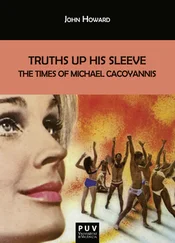'Since last year,' K said, not knowing whether it was a good lie or a bad lie.
'So when are your friends coming? When are your friends coming again?'
K shrugged.
'Ask him again,' said the officer, turning away. 'Keep asking him. Ask him when his friends are coming. Ask him when they were last here. See if he's got a tongue. See if he is such an idiot as he looks. '
The soldier who was holding K gripped the nape of his neck between thumb and forefinger and guided him down till he was kneeling, till his face was touching the earth. 'You heard what the officer said,' he said, 'so tell me. Tell me your story.' He flicked the beret away and pressed K's face hard into the earth. With nose and lips squashed flat, K tasted the damp soil. He sighed. They lifted him and held him up. He did not open his eyes. 'So tell us about your friends,' the soldier said. K shook his head. He was hit a terrific blow in the pit of the stomach and fainted.
They spent the afternoon hunting for the stocks of food and arms they were convinced were hidden there. First they scoured the area around the dam, then they explored further up and down the river. There was an instrument with earphones and a black box that one of them used: K watched him move slowly along the shoulder of the river bank, where the earth was soft, prodding his rod into the earth. Many of the pumpkins, perhaps all of them, were discovered: young men kept returning bearing pumpkins, which they tossed in a heap at the edge of the field. The pumpkins only made them more certain that there were stores hidden ('Otherwise why would they leave this monkey here?' K overheard).
They wanted to interrogate him again but he was plainly too weak. They gave him tea, which he drank, and tried to reason with him. 'You're sick, man,' they said. 'Look at you. Look at how your friends treat you. They don't care what happens to you. You want to go home? We'll take you home and give you a new start in life.'
They sat him up against a wheel of the jeep. One of them fetched the beret and dropped it in his lap. They offered him a slice of soft white bread. He swallowed a mouthful, leaned sideways, and brought it up, together with the tea. 'Leave him alone, he's finished,' someone said. K wiped his mouth on his sleeve. They stood in a circle about him; he had a feeling they did not know what to do.
He spoke. 'I'm not what you think,' he said. 'I was sleeping and you woke me, that's all. ' They gave no sign of understanding.
They quartered themselves in the farmhouse. In the kitchen they set up their own stove; soon K could smell tomatoes cooking. Someone had hung a radio on a hook on the step; the air was full of nervous electric rhythms that unsettled him.
They put him in the bedroom at the end of the corridor, on a tarpaulin folded in four, with a blanket over him. They gave him warm milk and two pills which they said were aspirin and which he kept down. Later, after dark, a boy brought him a plate of food. 'See if you can eat just a mouthful,' he said. He shone a flashlight on the plate. K saw two sausages in a thick gravy, and mashed potato. He shook his head and turned to the wall. The boy left the plate at the bedside ('In case you change your mind'). After that they did not disturb him. He drowsed uneasily for a while, troubled by the smell of the food. At last he got up and put the plate in a corner. Some of the soldiers were on the step, some in the living-room. There was talk and laughter but no light.
The next morning the police arrived from Prince Albert with dogs to help in the search for tunnels and hidden supplies. Captain Oosthuizen recognized K at once. 'How could I forget a face like that?' he said. 'This joker ran away from Jakkalsdrif in December. His name is Michaels. What name did he give you?' 'Michael,' said the army officer. 'It's Michaels,' said Captain Oosthuizen. He poked K in the ribs with his boot. 'He's not sick, he always looks like this. Hey, Michaels?'
So they took K back to the dam, where he watched the dogs drag their handlers back and forth across the acre of grass and up and down the river banks, whining with eagerness, tugging at the leash, but finally able to lead them to nothing better than old porcupine burrows and hare sets. Oosthuizen gave K a cuff on the side of the head. 'So what's this about, monkey?' he said. 'You playing games with us?' The dogs were loaded back into the van. Everyone was losing interest in the search. The young soldiers stood about in the sun talking, drinking coffee.
K sat with his head between his knees. Though his mind was clear, he could not control the dizziness. A string of spittle drooled from his mouth; he did not bother to stop it. Every grain of this earth will be washed clean by the rain, he told himself, and dried by the sun and scoured by the wind, before the seasons turn again. There will be not a grain left bearing my marks, just as my mother has now, after her season in the earth, been washed clean, blown about, and drawn up into the leaves of grass.
So what is it, he thought, that binds me to this spot of earth as if to a home I cannot leave? We must all leave home, after all, we must all leave our mothers. Or am I such a child, such a child from such a line of children, that none of us can leave, but have to come back to die here with our heads upon our mothers' laps, I upon hers, she upon her mother's, and so back and back, generation upon generation?
There was a heavy explosion, and at once a second explosion. The air shook, there was a clamour of birds, the hills rumbled and echoed. K stared around wildly. 'Look!' said a soldier, and pointed.
Where the Visagie house had once stood there was now a cloud of grey and orange, not mist but dust, as if a whirlwind were carrying the house away. Then the cloud stopped growing, its substance thinned, and a skeleton began to emerge: part of the back wall with the chimney; three of the supports that had held up the verandah. A sheet of roofing swooped out of the air and hit the ground noiselessly. The reverberations went on, but K did not know any more if they were in the hills or in his head.
Swallows flew past, so low above the ground he could have touched them had he stretched out a hand.
Afterwards there were more explosions, for which he did not look up, guessing that the outbuildings had gone. He thought: No longer do the Visagies have anywhere to hide.
The jeep came bumping back across the veld. All around him they were clearing and packing up. In the acre itself, however, a lone soldier was still at work. He was digging up tufts of grass and laying them carefully to one side. With some anxiety K rose to his feet and stumbled across. 'What are you doing?' he called. The soldier did not answer. He began to shape a shallow pit, laying the earth on a black plastic sheet. This was the third hole he had dug, K saw: both of the others had neat piles of earth on plastic sheets beside them, and tufts of grass with the earth still clinging to their roots. 'What are you doing?' he asked again. The sight of the stranger digging up his earth agitated him more than he would have guessed. 'Let me do it,' he offered-'I am used to digging:' But the soldier waved him away. Completing the third hole, he stepped off eight paces and laid down another plastic sheet. As the spade bit into the earth, K squatted and covered the grass with his hands. 'Please, my friend!' he said. The soldier stood back, exasperated. Someone hauled K back by the scruff of his neck. 'Just keep him out of my way,' said the soldier.
K stood by the pump and watched. When he had dug five holes in a zigzag pattern, the soldier unrolled a long white cord to mark off the area. Two of his comrades brought a crate from the truck and began to lay the mines. As they laid each and primed it, the first soldier planted the grass and poured the earth back, handful by handful, patted the surface down, and brushed away all their prints with a hand-broom, moving backwards on hands and knees.
Читать дальше











